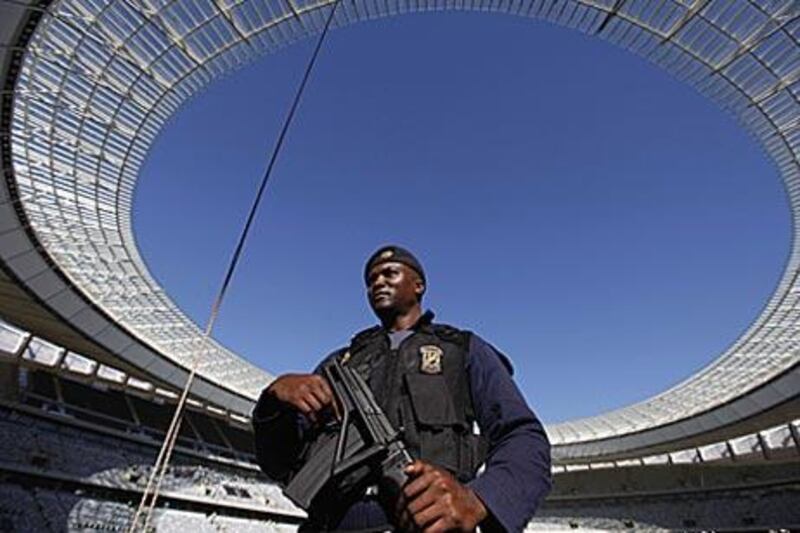Five charged with terrorism as officials crack down in a nation with one of the highest murder rates in the world, writes Sebastian Berger. Nathi Mthethwa, the South Africa police minister, was pleased with the results of the investigation. Five people had been charged with terrorism, he said, after raids across the country uncovered arms caches and weapons in connection with alleged plots to mount attacks during the World Cup.
He said that some of the people who were arrested were planning to bomb black townships ahead of the football World Cup. Mthethwa and other officials have promised the World Cup will be safe. More than 40,000 police officers, 8,500 of them trained by France's Gendarmerie, will be on duty throughout the event, with support from Interpol and other personnel from some of the countries competing in the tournament.
"Any type of behaviour, be it criminality or terrorism, will be dealt with swiftly and with no mercy," Mthethwa said. If police succeed in keeping the World Cup incident-free, it will be in part because of the work they have done in advance, uncovering potential troublemakers. In one case, in Worcester in the Western Cape, a former lieutenant-colonel in the apartheid-era commandos was held after almost 10,000 rounds of ammunition, rifles, a pistol, explosives and uniforms were found at his home.
Weapons, explosives and equipment were allegedly also found in a storeroom at the town's magistrates' court, where the head of security, said to be a former member of the right-wing Afrikaner Weerstandsbeweging (AWB), was arrested. More raids took place in, Pretoria, the capital and in the northern province of Limpopo. There have been concerns about such movements - and other security and safety issues - ever since the prospect of South Africa hosting the World Cup was first proposed.
For the most part, the worry has been about the country's appalling crime rates - almost 50 people are murdered every day, one of the highest per-capita ratios in the world for a country not at war, and more than 100 women are raped daily. Explanations for the phenomenon focus on poverty, inequality, and the legacy of apartheid. Other traumatised societies, such as Cambodia, also have elevated levels of child rape, for example.
In a highly stratified society where the bottom layers, namely African men, spent their lives being told that they were worthless, experts say, it is unlikely that criminals will place much value on their own lives, let alone the lives of their victims. Even though most crime takes place in poor, predominantly black neighbourhoods, it is what Jacob Zuma, the South Africa president, described as its "uniquely violent" characteristics - the fact that robbers or muggers often kill their victims even after they have got what they wanted - that leave many citizens putting it as their most important worry and emigrants citing fear of crime as a reason for their departure.
Every day newspapers carry gruesome accounts of attacks and killings, and earlier this month police discovered two-and-a-half tonnes of stolen commercial explosives south of Johannesburg. Bombings of cash machines to get to the notes inside have increased dramatically in recent years. Foreign media, meanwhile, have been accused of exaggerating the risks. British and German newspapers have delighted in stories of bullet and stab-proof vests being required.
In the aftermath of the killing of Eugene Terreblanche, an AWB leader, in April, one tabloid newspaper in the UK claimed that "machete gangs were roaming the streets" and that fans faced becoming victims of a race war. The armed attack on the bus carrying the Togo team, including Manchester City's Emmanuel Adebayor, in the Angolan exclave of Cabinda, as the side arrived for the African Cup of Nations earlier this year, killing three people, did nothing to help.
Fears escalated, even though the attack was carried out by a little-known local separatist group and South Africa has no history of similar incidents during the democratic era. Danny Jordaan, the chief executive of the Local Organising Committee, had to hold a press conference to point out that the incident took place two countries and thousands of miles away. The situation has left the South African authorities with a dilemma, trying, as part of their marketing effort, to reassure overseas World Cup tourists that they will be safe, while at the same time telling their domestic audience that the problem is being taken seriously and addressed.
There has been debate over extending the police's right to shoot to kill, thousands of extra officers have been recruited, and the police have been militarised, with Bheki Cele, the national commissioner, now enjoying the rank of general. The reality is that while a huge security operation is planned to ensure that the official venues - stadiums, fan parks and the like - will be safe, the problem is most likely to rear its head elsewhere.
"Starting on the June 11, people will be safe in South Africa," Cele said earlier this year - begging the question among locals of why the authorities did not ensure safety at other times if they were able to do so. The issue was amply demonstrated at the time of the draw for the World Cup qualifying groups in Durban in 2007, when Jackie Selebi, Cele's predecessor, promised that no one coming for the occasion would be a victim of crime, only to have an Austrian sports consultant shot dead on a golf course for ZAR320 (Dh155) and his mobile phone.
sports@thenational.ae





